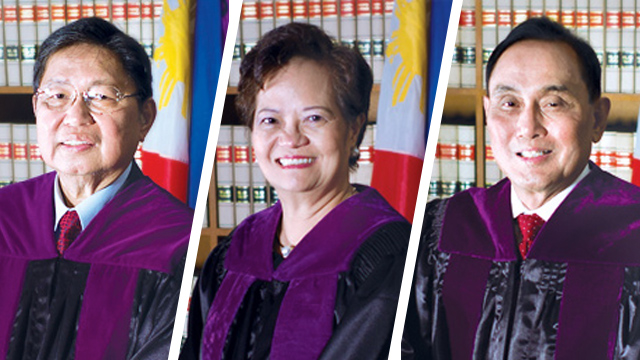
MANILA, Philippines – A week ago, the Supreme Court upheld its decision allowing presidential candidate Grace Poe to run for the 2016 elections.
Even if the decision is already final, 4 of the 6 justices who voted against Poe questioned the main decision or ponencia for saying the Commission on Election (Comelec) "cannot itself, in the same cancellation case [based on the ground of false material representation], decide the qualification or lack thereof of the candidate."
In his 78-page dissenting opinion released Saturday, April 9, Justice Arturo Brion called this the "height of illogic."
"A continuing source of wonder in reading the ponencia is how it could rule that the Comelec's cancellation of Grace Poe's [certificate of candidacy] could be void (because the Comelec had no authority or jurisdiction to make the ruling) and at the same time declare Grace Poe qualified to run for the presidency of this country," he said.
To explain further, Brion simplified the Court's decision in a way a "legally unschooled mind" would interpret it: "Wala palang kapangyarihan ang Comelec at 'di pala ito puwede magbigay ng kapasiyahan sa certifico ng kandidatura ni Grace Poe, kaya kandidato pa rin si Grace Poe."
(Comelec has no power and it cannot decide on the certificate of candidacy of Grace Poe, so Grace Poe is still a candidate.)
"That would not have been a bad reasoning for a legal layman and should at least be a reasoning track that should not escape the Supreme Court itself," Brion added.
Senior Associate Justice Antonio Carpio said such ruling means the SC can only annul the decision of the Comelec en banc – it cannot rule on the merits, "that is, decide the qualifications of a candidate, because there is no Comelec decision to review on the merits, the annulled decision of the Comelec being non-existent."
But the main decision goes: "Petitioner Mary Grace Natividad Sonora Poe-Llamanzares is declared qualified to be a candidate for President in the National and Local Elections of 9 May 2016."
'Controversial, radical'
Justices Teresita Leonardo-de Castro and Bienvenido Reyes both shared Brion and Carpio's sentiments. De Castro even called this part "one of the most controversial and radical pronouncements" of the ponencia.
"In respondent Elamparo, et al.'s motion for reconsideration, they rightly contend that there is no legal basis to consider this pronouncement as a majority decision considering that 9 of the 15 justices of the Court found the Comelec to have jurisdiction to rule on these qualifications," she explained.
Aside from the 6 dissenters, De Castro said Justices Benjamin Caguioa, Diosdado Peralta, and Francis Jardeleza issued opinions that the Comelec should rule on these qualifications. (READ: EXPLAINER: Can Comelec ‘disqualify’ Grace Poe?)
Peralta concurred with Caguioa's separate concurring opinion on the 47-page main decision.
Reyes, for his part, said the Comelec has the power to rule on the qualifications of a candidate if it has the power to determine whether a candidate materially misrepresented his qualifications in the COC.
"Indeed, it would be the height of absurdity to deny the Comelec the power to rule on the qualifications of the candidate considering that it can, under Section 78 of the [Omnibus Election Code], inquire into the qualifications of the candidate for purposes of determining whether there is material misrepresentation in the COC."
He said the Comelec can rule on a candidate's qualifications prior to election because of the Constitution's "broad and general grant of power" to the poll body "to enforce and administer election laws even in the absence of any declaration by a final judgment from a competent court."
Brion pointed out that if indeed the Comelec did not have the jurisdiction to cancel Poe's COC, then rulings made on her citizenship and residency "are obiter dicta or non-binding observations."
Like Carpio, Brion, De Castro, and Reyes also noted in their opinions that no majority in the SC holds Poe as a natural-born Filipino. Chief Justice Maria Lourdes Sereno dismissed this as a move by the minority to belittle the Court's main decision. (READ: Grace Poe a natural-born Filipino – Supreme Court)
On SolGen's statistics
The dissenters also questioned the use of statistics that "point to a very high possibility that [Poe's] parents were Filipinos."
"What is at stake here is the citizenship eligibility of a candidate seeking the highest position in the land. The Court cannot leave this matter to demonstrability, probability, and plausibility, especially when the Constitution demands certainty," Reyes explained.
De Castro said there is no natural-born citizenship by probability under the Constitution.
Brion, meanwhile, noted that the statistics presented by Solicitor General Florin Hilbay during the oral arguments were introduced in evidence only on appeal, and not by direct parties to the case.
"These circumstances lead me to ask: should the Comelec now be held responsible for not considering data and arguments that were never brought in the Section 78 proceedings before it?" he added. (READ: SC justice to SolGen: Cite legal basis, not statistics)
Read the dissenting opinions of the 4 justices below.
Dissenting Opinion - De Castro
– Rappler.com